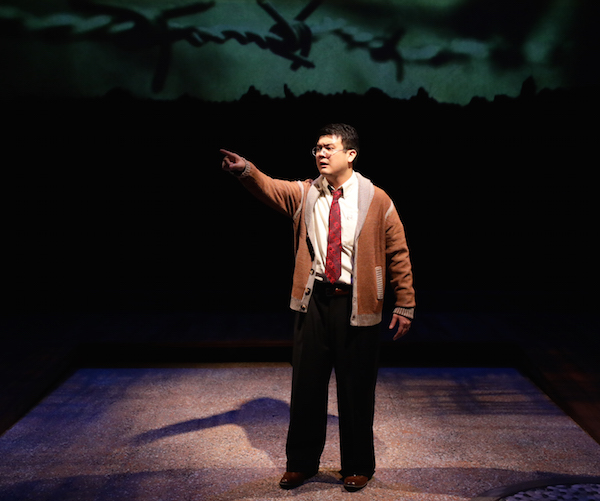Theater Review: “Hold These Truths” — A Vital Lesson
Hold These Truths is an invaluable reminder that alternative facts are not a new thing.
Hold These Truths by Jeanne Sakata. Directed by Benny Sato Ambush. Choreography by Jubilith Moore. Staged by the Lyric Stage Company of Boston, 140 Clarendon Street, Boston, MA, through December 31.

Michael Hisamoto as Gordon Hirabayashi in the Lyric Stage Company production of “Hold These Truths.” Photo: Mark S. Howard.
By Bill Marx
In these scoundrel times, Jeanne Sakata’s Hold These Truths teaches a vital lesson, especially given that this year marks the 75th anniversary of Franklin Delano Roosevelt’s Executive Order 9066, a shameful action propelled by war hysteria, xenophobia, and craven civilian surrender to military authority. An estimated 120,000 persons of Asian ancestry on the West Coast were, in the name of ‘national security,’ uprooted, transported, and then incarcerated. This earnest one-man doc-u-drama focuses on the efforts of Japanese-American Gordon Hirabayashi to overturn, through the legal system, this terrible injustice. His case against the President’s Order went all the way to the Supreme Court. He lost, but decades later he was vindicated when evidence came to light that the military had flat-out lied. (Hirabayashi was posthumously awarded the Presidential Medal of Freedom in 2012 by President Barack Obama.) If for nothing else, Hold These Truths is an invaluable reminder that alternative facts are not a new thing.
Sakata places Hirabayashi in the Ibsen-esque ‘enemy of the people’ mold: an individual dares to take on government sanctioned hatred (and denial of the truth). Our hero spends time in jail while he struggles to make America live up to its own ideals; he has to buck some of those in his family and Asian community who are convinced that, even though lives and livelihoods are being destroyed, it would be better not to question orders during wartime. The resonances with what is happening today in the era of Trump’s travel ban and divisive rhetoric is obvious and bear repeating: it is impossible to argue with the play as a huzzah for political activism as well as a testament to America’s undeniable strength as a nation of immigrants.
Though, in the interests of critical complication, perhaps the one-man-against-the-system model should make way for a fresher paradigm (Brechtian or otherwise): why not dramatize how a community, with its disparate individuals and agendas, comes together to protect its rights and values against unjust actions? Or how a community fails to do so? (The catch: plays of this expansive variety need a large cast, and that is often a no-go in these budget-scrimping times, except for musicals.) But isn’t it about time that American theater audiences had their conventional belief in the quixotic power of individuality questioned? Rather than catered to?
Not that there is anything weak in this fine Lyric Stage Company production, gracefully staged by director Benny Sato Ambush, who is aided mightily by the adroit, feathery movements of the kurogos (Khloe Alice Lin, Gary Thomas Ng, and Samantha Richert). The trio’s actions as stagehands (and, on occasion, pantomimists) are deftly choreographed by Jubilith Moore. What’s more, at a time when technology is being unleashed full bore on stage, Ambush keeps his use of multi-media to an effective minimum. The actor is at the center of the narrative; he doesn’t have to fend off photos or video footage. As Hirabayashi, Michael Hisamoto provides a powerful portrait of stubborn decency; our protagonist is an easy-going, modest, and resilient man (a model Quaker) who is somehow made of intractable stuff, even in the face of overwhelming odds. (Sakata doesn’t look very deeply into where Hiabayashi’s resoluteness comes from, aside from his disappointment that America is falling short of its promise.) The actor changes his voice and posture to play other characters; this strategy helps populate the proceedings, though not enough to help us understand those who disagree with Hirabayashi’s lonely stand.
Ironically, it is our hero’s resolute amiability that limits the power of this study in political rectitude. The man and his achievement are admirable – but being admirable does not always mean being particularly dramatic. Ibsen made sure that his cornered truth teller contained plenty of flaws, afflicting him with off-putting delusions of grandeur. Sakata never suggests that, at some point along the line, Hirabayashi was tested to the point of despair, that he needed to grapple with inner demons and debilitating doubts. There are no dark nights of the soul here, no bouts of anger, nothing to mar a picture of sweet-natured humanity triumphant. Hirabayashi’s loving relationship with his all-accepting wife is strictly Hallmark Cards. Hold These Truths doesn’t generate much tension to speak of until the issue of internment enters Hirabayashi’s life and, even then, the text moves with unflappable equanimity from one defeat to another. It is as if Hirabayashi, like the members of the audience, knows that everything is going to turn out all right — there’s a medal waiting for him at the end of his ordeal.
Bill Marx is the editor-in-chief of The Arts Fuse. For over three decades, he has written about arts and culture for print, broadcast, and online. He has regularly reviewed theater for National Public Radio Station WBUR and The Boston Globe. He created and edited WBUR Online Arts, a cultural webzine that in 2004 won an Online Journalism Award for Specialty Journalism. In 2007 he created The Arts Fuse, an online magazine dedicated to covering arts and culture in Boston and throughout New England.
